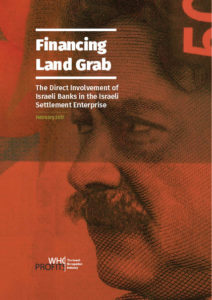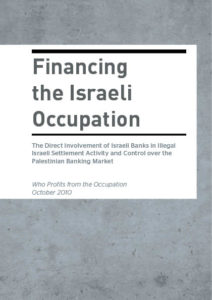First International Bank of Israel

Full Text
הבנק הבינלאומי הראשון
Head office: 42 Rothchild Blvd,. P.O.B 2110, Tel-Aviv Tel: +972-3-5196223
An Israeli commercial bank.
In 2020, the bank was part of a consortium led by Bank Hapoalim to finance the expansion of the Red Line and the establishment of the Green Line as part of the Jerusalem Light Rail.
In 2021, the bank accompanied the Israeli company Bardarian Brothers in its project in Atarot settlement. The company was contracted by Moriah Jerusalem Development Corporation to establish a parking lot for buses in Atarot. The bank holds as collateral all of the company's rights in the project, and all of the profits from the asset, as well as the right to receive VAT refunds and any other funds from Israeli tax authorities in relation to this project.
In 2021, the bank granted a loan to the company Ram Aderet- Salit for a construction project on 7,657 meters of land in Givat HaMatos settlement in occupied East Jerusalem, according to plan מק\19245- Guidelines for Unification and Division without Owners` Consent in Givat HaMatos. The bank holds as collateral the company’s contractual and actual rights in the land and project, including the right to receive funds from homebuyers and the right to receive VAT refunds and any other funds from Israeli tax authorities in relation to this project.
In 2019, the company Ram Aderet reached an agreement with the bank, along with another financial institution (insurance company), to accompany it in the construction of around 300 new housing units in the settlement of Ariel.
In 2017, Who Profits documented the vast involvement of the bank in settlement construction and infrastructure works on occupied territory. The report showed that the First International Bank of Israel accompanied construction projects in the settlement of Modi'in Ilit, and accompanied infrastructure work on highway 50, which connects the northern settlements of East Jerusalem – through the city center – with Highway 60 (the Tunnels Highway) and the settlement of Gilo in the south of East Jerusalem. Some of the projects were constructed by companies profiled on our database, such as Shapir Civil and Marine Engineering and Minrav Group. The report has also shown that through its then-subsidiary, Bank Otsar HaHayal (which was merged with the bank in 2019) the bank provided loans to local authorities of settlements and to Israeli businesses operating in the occupied territory. Click here to read the full report about the involvement of the Israeli banks in the settlement enterprise from February 2017.
Massad Bank, a subsidiary of the bank, operates a branch in the French Hill settlement neighborhood in occupied East Jerusalem.
In 2018, Who Profits documented the bank's involvement in accompanying road infrastructure projects on occupied territory, such as the expansion of Road 50. Click here to read full update.
An Israeli commercial bank.
In 2020, the bank was part of a consortium led by Bank Hapoalim to finance the expansion of the Red Line and the establishment of the Green Line as part of the Jerusalem Light Rail.
In 2021, the bank accompanied the Israeli company Bardarian Brothers in its project in Atarot settlement. The company was contracted by Moriah Jerusalem Development Corporation to establish a parking lot for buses in Atarot. The bank holds as collateral all of the company's rights in the project, and all of the profits from the asset, as well as the right to receive VAT refunds and any other funds from Israeli tax authorities in relation to this project.
In 2021, the bank granted a loan to the company Ram Aderet- Salit for a construction project on 7,657 meters of land in Givat HaMatos settlement in occupied East Jerusalem, according to plan מק\19245- Guidelines for Unification and Division without Owners` Consent in Givat HaMatos. The bank holds as collateral the company’s contractual and actual rights in the land and project, including the right to receive funds from homebuyers and the right to receive VAT refunds and any other funds from Israeli tax authorities in relation to this project.
In 2019, the company Ram Aderet reached an agreement with the bank, along with another financial institution (insurance company), to accompany it in the construction of around 300 new housing units in the settlement of Ariel.
In 2017, Who Profits documented the vast involvement of the bank in settlement construction and infrastructure works on occupied territory. The report showed that the First International Bank of Israel accompanied construction projects in the settlement of Modi'in Ilit, and accompanied infrastructure work on highway 50, which connects the northern settlements of East Jerusalem – through the city center – with Highway 60 (the Tunnels Highway) and the settlement of Gilo in the south of East Jerusalem. Some of the projects were constructed by companies profiled on our database, such as Shapir Civil and Marine Engineering and Minrav Group. The report has also shown that through its then-subsidiary, Bank Otsar HaHayal (which was merged with the bank in 2019) the bank provided loans to local authorities of settlements and to Israeli businesses operating in the occupied territory. Click here to read the full report about the involvement of the Israeli banks in the settlement enterprise from February 2017.
Massad Bank, a subsidiary of the bank, operates a branch in the French Hill settlement neighborhood in occupied East Jerusalem.
In 2018, Who Profits documented the bank's involvement in accompanying road infrastructure projects on occupied territory, such as the expansion of Road 50. Click here to read full update.
Related Publications
Be a part of our community
Join Our Mailing List
First International Bank of Israel
הבנק הבינלאומי הראשון
Head office: 42 Rothchild Blvd,. P.O.B 2110, Tel-Aviv Tel: +972-3-5196223
An Israeli commercial bank.
In 2020, the bank was part of a consortium led by Bank Hapoalim to finance the expansion of the Red Line and the establishment of the Green Line as part of the Jerusalem Light Rail.
In 2021, the bank accompanied the Israeli company Bardarian Brothers in its project in Atarot settlement. The company was contracted by Moriah Jerusalem Development Corporation to establish a parking lot for buses in Atarot. The bank holds as collateral all of the company's rights in the project, and all of the profits from the asset, as well as the right to receive VAT refunds and any other funds from Israeli tax authorities in relation to this project.
In 2021, the bank granted a loan to the company Ram Aderet- Salit for a construction project on 7,657 meters of land in Givat HaMatos settlement in occupied East Jerusalem, according to plan מק\19245- Guidelines for Unification and Division without Owners` Consent in Givat HaMatos. The bank holds as collateral the company’s contractual and actual rights in the land and project, including the right to receive funds from homebuyers and the right to receive VAT refunds and any other funds from Israeli tax authorities in relation to this project.
In 2019, the company Ram Aderet reached an agreement with the bank, along with another financial institution (insurance company), to accompany it in the construction of around 300 new housing units in the settlement of Ariel.
In 2017, Who Profits documented the vast involvement of the bank in settlement construction and infrastructure works on occupied territory. The report showed that the First International Bank of Israel accompanied construction projects in the settlement of Modi'in Ilit, and accompanied infrastructure work on highway 50, which connects the northern settlements of East Jerusalem – through the city center – with Highway 60 (the Tunnels Highway) and the settlement of Gilo in the south of East Jerusalem. Some of the projects were constructed by companies profiled on our database, such as Shapir Civil and Marine Engineering and Minrav Group. The report has also shown that through its then-subsidiary, Bank Otsar HaHayal (which was merged with the bank in 2019) the bank provided loans to local authorities of settlements and to Israeli businesses operating in the occupied territory. Click here to read the full report about the involvement of the Israeli banks in the settlement enterprise from February 2017.
Massad Bank, a subsidiary of the bank, operates a branch in the French Hill settlement neighborhood in occupied East Jerusalem.
In 2018, Who Profits documented the bank's involvement in accompanying road infrastructure projects on occupied territory, such as the expansion of Road 50. Click here to read full update.
Ownership
The bank is owned by F.I.B.I Holdings Ltd, which owns 48.34% of the shares. F.I.B.I Holdings is owned by Binohon Ltd (28.54%), Instenz 2 Ltd. (11.68%) and Dolphin Energies Ltd. (11.685). Instenz 2 and Dolphin Holdings are owned by Michael and Helen Ables and the Liebrman family.
Chairman of board of directors - Ron Levkovich
CEO- Smadar Barbar Tsadik
Subsidiaries
Massad Bank Ltd. (51%); Ubank Trust Company Ltd. (100%); First International Issues Ltd. (100%); Habeinleumi Unique Investment Management Ltd. (100%); Israel Credit Cards Ltd. (28.2%).
The bank also invests in the following companies: Stocopin Israel Ltd and Portrab Investment Company Ltd.
Partners
* This section refers to the company's general business partners





